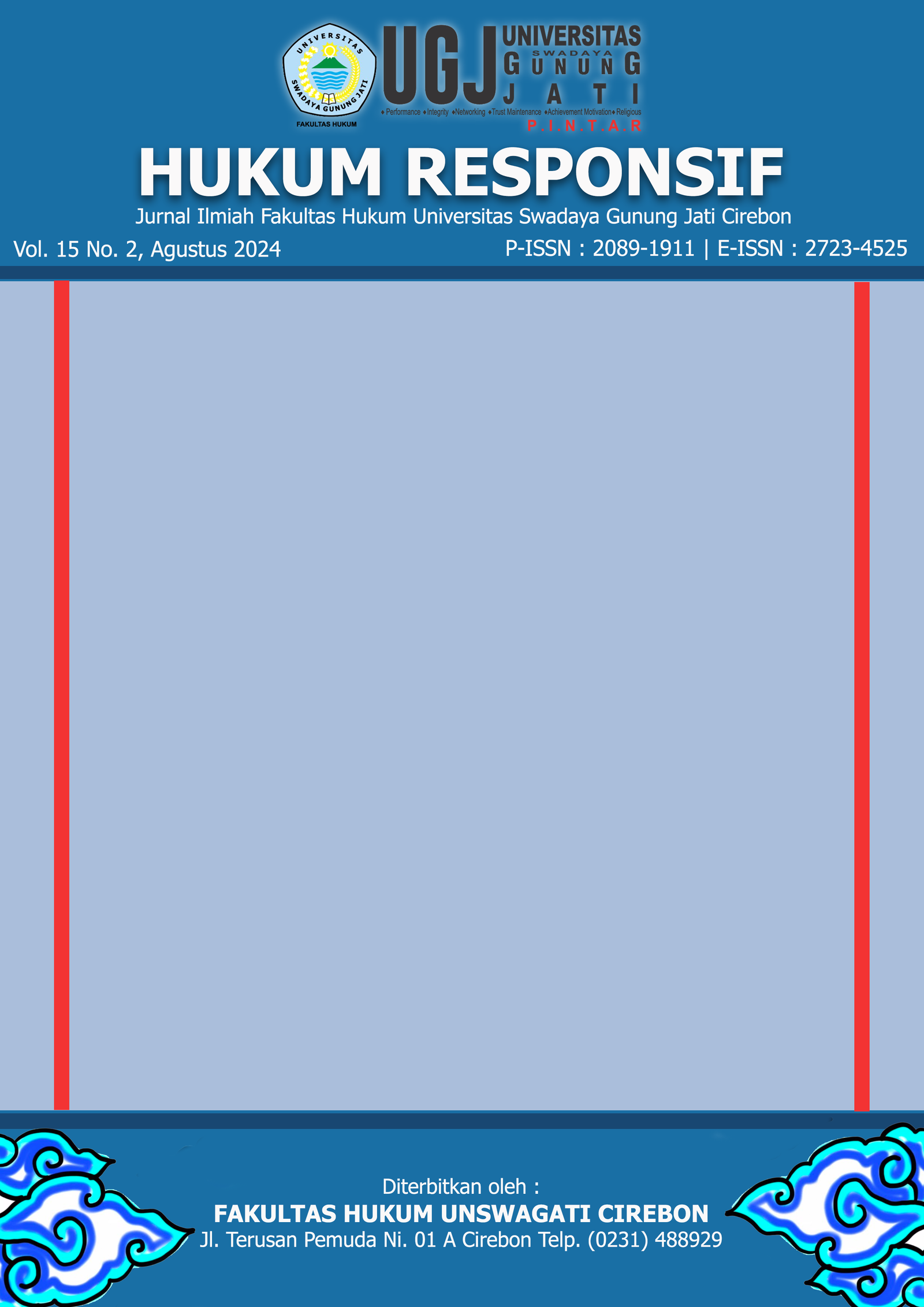CHALLENGES AND SOLUTIONS FOR DEMOCRATIC STABILITY IN INDONESIA AFTER THE CANCELLATION OF ELECTION REGULATIONS
DOI:
https://doi.org/10.33603/responsif.v15i2.9532Kata Kunci:
democratic stability, legal uncertainty, simultaneous regional elections, Indonesian Supreme Court, regulatory changesAbstrak
This paper explores the impact of the cancellation of electoral regulations, specifically PKPU No. 9 of 2020, on the stability of democracy in Indonesia. The decision by the Indonesian Supreme Court (Mahkamah Agung RI) to annul this regulation has created significant legal uncertainty, potentially disrupting the simultaneous regional elections (Pilkada). This study aims to analyze the challenges faced by the government and the General Election Commission (KPU) in responding to this decision, and to evaluate solutions that can be implemented to maintain democratic stability. Utilizing a qualitative analysis method, the paper identifies key issues such as regulatory changes, the potential delay of Pilkada, and increased administrative burdens. The findings highlight the importance of legal certainty and effective coordination among the government, election authorities, and the public to address these challenges. The study also proposes several solutions to enhance the electoral process and uphold democratic integrity in the future.
Referensi
Altman, D., & Pérez-Liñán, A. (2021). The Role of Judicial Decisions in Electoral Uncertainty: A Comparative Analysis. Journal of Democracy, 32(2), 57-72.
Ariani, D. (2023). Administrative Burdens in Election Regulation Changes. Asian Journal of Political Science, 29(1), 90–105.
Dawson, D., & Nash, C. (2023). Legislative Solutions to Electoral Regulation Challenges. Electoral Studies, pp. 50, 210–225.
Eder, C., & Pappas, T. (2023). Principles of Electoral Justice and Their Impact on Democratic Stability.
European Journal of Political Research, 62(3), 465-482.
Gupta, S., & Khamis, M. (2021). Coordinating Election Reforms: Strategies and Outcomes. Public Administration Review, 81(4), 123–136.
Hidayat, S. (2021). Legal Uncertainty in Indonesian Electoral Systems. Indonesian Law Journal, 45(1), 44–59.
Kline, R. (2022). Election Delays and Administrative Challenges: Case Studies. Journal of Political Institutions, 19(2), 74–89.
Kumar, R., & Singh, A. (2021). Public Education and Media Role in Electoral Processes. Journal of Political Communication, 38(4), 305–321.
Magar, M., & Thapa, S. (2022). Administrative Efficiency in Electoral Processes. South Asian Studies, 40(2), 132-147.
Mahmud, S. (2022). Capacity Building for Electoral Management. Journal of Election Studies, pp. 54, 101–115. Nugroho, S. (2020). The Role of PKPU in the Indonesian Electoral System. Indonesian Journal of Governance,
(2), 22-37.
Wong, K., & Chen, Y. (2021). Monitoring Electoral Reforms: Best Practices. Global Review of Political Science, 33(1), 81-98.
Zhao, L., & Zhang, Y. (2021). Legal Theories in Electoral Justice and Their Practical Implications. Journal of Law and Society, 48(3), 256–270.
Unduhan
Diterbitkan
Terbitan
Bagian
Lisensi
Hak Cipta (c) 2024 Henokh Hasudungan Hutagalung, Sugianto, Anwar Sanusi

Artikel ini berlisensiCreative Commons Attribution-ShareAlike 4.0 International License.
The Authors submitting a manuscript do so on the understanding that if accepted for publication, copyright of the article shall be assigned to Jurnal HUKUM RESPONSIF, Fakultas Hukum Universitas Swadaya Gunung Jati. Universitas Swadaya Gunung Jati as publisher of the journal. Copyright encompasses rights to reproduce and deliver the article in all form and media, including reprints, photographs, microfilms, and any other similar reproductions, as well as translations.
Jurnal HUKUM RESPONSIF, Universitas Swadaya Gunung Jati and the Editors make every effort to ensure that no wrong or misleading data, opinions or statements be published in the journal. In any way, the contents of the articles and advertisements published in Jurnal HUKUM RESPONSIF the sole responsibility of their respective authors and advertisers.

















